|
|
|
Sort Order |
|
|
|
Items / Page
|
|
|
|
|
|
|
| Srl | Item |
| 1 |
ID:
161157


|
|
|
|
|
| Summary/Abstract |
The Organization of Arab Petroleum Exporting Countries (OAPEC) members’ decision in October 1973 to impose an oil embargo upon the United States was a historic turning point. Although the embargo against the United States was lifted in March 1974, the potential threat of a new embargo continued to shadow U.S.–Saudi relations. In response, Washington developed serious contingency plans. The article analyzes the factors that led the U.S. Congress in 1975 to commission a feasibility study entitled Oil Fields as Military Objectives, and attempts to answer how effective the threat of military occupation of the oil fields and the commissioning of the study itself actually were in “persuading” Saudi Arabia to end contemplating imposing a second embargo.
|
|
|
|
|
|
|
|
|
|
|
|
|
|
|
|
| 2 |
ID:
191865
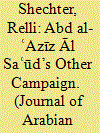

|
|
|
|
|
| Summary/Abstract |
This article focuses on the propaganda campaign that advisors to ʿAbd al-ʿAzīz Āl Saʿūd (“Ibn Saud”) –– emir, later sultan, of Najd and, later again, king of Najd and Hijaz, and finally king of Saudi Arabia –– engaged in between 1918 and 1932. It argues that this prolonged campaign was as crucial to the establishment of the state as the sultan’s military conquest of the land. I term this a “campaign” because it was a connected attempt, having constant, clear messages emphasising ʿAbd al-ʿAzīz’s positive leadership qualities, his reformist, modernising intent, and a positive representation of Wahhabism. It also disparaged his enemies and emphasised the natural unity of his recently conquered land. The campaign was central to persuading regional and global powers of the viability of ʿAbd al-ʿAzīz’s state-making project, and later, to gaining official diplomatic recognition of the Saudi state. The article studies this unfolding campaign through analysis of autobiographies, memoirs, travel and history books and articles written by ʿAbd al-ʿAzīz’s advisors; critical engagement with recent ample information on these advisors found on Saudi websites and in Saudi history books and the press; and US diplomatic correspondence.
|
|
|
|
|
|
|
|
|
|
|
|
|
|
|
|
| 3 |
ID:
161316
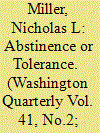

|
|
|
| 4 |
ID:
098963
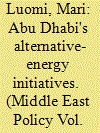

|
|
|
| 5 |
ID:
137950
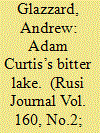

|
|
|
|
|
| Summary/Abstract |
On 14 February 1945, King Abdul-Aziz ibn Saud of Saudi Arabia stepped aboard the USS Quincy, anchored in the Great Bitter Lake in the Suez Canal, to meet the dying American president, Franklin D Roosevelt. Roosevelt was returning from Yalta where, with Joseph Stalin and Winston Churchill, he had decided the fate of the post-war world. Roosevelt and Ibn Saud had a convivial discussion for several hours before going their separate ways.
|
|
|
|
|
|
|
|
|
|
|
|
|
|
|
|
| 6 |
ID:
112280
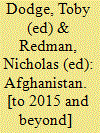

|
|
|
|
|
| Publication |
Oxon, International Institute for Strategic Studies, 2011.
|
| Description |
299p.
|
| Series |
Adelphi Series No. 425-26
|
| Standard Number |
9780415696425
|
|
|
|
|
|
|
|
|
|
|
|
Copies: C:1/I:0,R:0,Q:0
Circulation
| Accession# | Call# | Current Location | Status | Policy | Location |
| 056419 | 958.1047/DOD 056419 | Main | On Shelf | General | |
|
|
|
|
| 7 |
ID:
080246
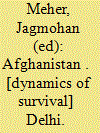

|
|
|
|
|
| Publication |
New Delhi, Kalpaz Publications, 2008.
|
| Description |
311p.hbk
|
| Standard Number |
9788178356402
|
|
|
|
|
|
|
|
|
|
|
|
Copies: C:1/I:0,R:0,Q:0
Circulation
| Accession# | Call# | Current Location | Status | Policy | Location |
| 053079 | 958.1/MEH 053079 | Main | On Shelf | General | |
|
|
|
|
| 8 |
ID:
093936
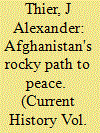

|
|
|
|
|
| Publication |
2010.
|
| Summary/Abstract |
Even if all essential parties are interested in a negotiated settlement, getting to yes is no sure thing.
|
|
|
|
|
|
|
|
|
|
|
|
|
|
|
|
| 9 |
ID:
106430
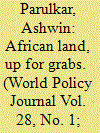

|
|
|
|
|
| Publication |
2011.
|
| Summary/Abstract |
Sheikh Mohammed Hussein Ali Al Amoudi, a citizen of Saudi Arabia, spends his time shuttling between Riyadh and Ethiopia, where he was born in a village 64 years ago. The son of a Yemeni father and Ethiopian mother, Al Amoudi boasts an estimated net worth of $10 billion. He is the richest Ethiopian and, according to Forbes, the 64th richest man in the world. Forty-five years ago, he emigrated to Saudi Arabia and built his fortune in oil refineries and the booming construction industry.
|
|
|
|
|
|
|
|
|
|
|
|
|
|
|
|
| 10 |
ID:
083402
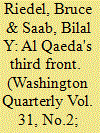

|
|
|
|
|
| Publication |
2008.
|
| Summary/Abstract |
After the September 11 attacks, Osama bin Laden launched a third front beyond Afghanistan and Iraq: his own homeland in Saudi Arabia. Saudi authorities have so far successfully countered al Qaeda's offensive, but the war inside the kingdom is far from over.
|
|
|
|
|
|
|
|
|
|
|
|
|
|
|
|
| 11 |
ID:
097156
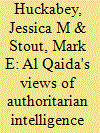

|
|
|
|
|
| Publication |
2010.
|
| Summary/Abstract |
Al Qaida and its jihadist allies shape their plans and operations substantially in response to threats they face from authoritarian intelligence services of the Middle East. While most jihadists initially believed that victory over their 'near enemies'- so-called 'apostate' regimes - should be their top priority, the ruthlessly effective security apparatuses of their home countries were significant factors in the transition to 'global jihadism', which emphasized the fight against the 'far enemy': the United States. This article presents al Qaida's views of the region's domestic intelligence services by examining captured documents and open source materials.
|
|
|
|
|
|
|
|
|
|
|
|
|
|
|
|
| 12 |
ID:
068371


|
|
|
| 13 |
ID:
164373
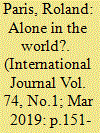

|
|
|
|
|
| Summary/Abstract |
Canada has found itself in serious diplomatic disputes over the past year with Saudi Arabia and China. The Saudis took issue with the Canadian foreign minister’s call to release human rights activists from prison, whereas China was angry at Canada’s arrest of a senior Chinese executive on an extradition request from the United States. These incidents should not be viewed as isolated aberrations. Authoritarian regimes seem increasingly emboldened to lash out at countries that displease them, including allies of the United States. But Ottawa has succeeded in rallying considerable international support for its position in the China dispute, suggesting that while Canada may be exposed, it is not destined to be alone
|
|
|
|
|
|
|
|
|
|
|
|
|
|
|
|
| 14 |
ID:
186313
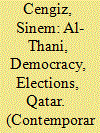

|
|
|
|
|
| Summary/Abstract |
Numerous studies have examined the decades-old Saudi-Iranian rivalry, which has played out in various regional arenas, notably Syria, Iraq, Yemen, Lebanon, and the Gulf. This article explores the place that Kurdistan Regional Government (KRG) in northern Iraq occupies within this rivalry. As the KRG’s foreign relations have attracted scholarly attention since the late 1990s, the article examines the Saudi Arabia–KRG relations in the post-2003 Iraq War, with a special focus on growing Iranian influence in Iraq. The end of Saddam Hussein’s rule and the subsequent rise of Shiite-dominated governments in Baghdad has shaken the regional balance, bringing out Iran as an influential actor in the Middle East. This laid the foundation for new understandings in the Saudi regional policy as Riyadh emphasized its relations with Iraq and the KRG, which became a crucial factor that can balance and imbalance power in the Middle East. It argues that common concerns for security and relative gains paved the way for a closer relationship between Riyadh and Erbil to counter threats emanating from both Iran and ISIS. Through case-specific information to those interested in Kurdish politics and the Middle East, it not only delves into the driving forces behind Riyadh-Erbil relations but also aims to present the Saudi interpretation of the 2017 Kurdish referendum.
|
|
|
|
|
|
|
|
|
|
|
|
|
|
|
|
| 15 |
ID:
188452
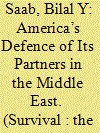

|
|
|
|
|
| Summary/Abstract |
The main factors American presidents typically consider before committing military resources to protect a partner include perceived US national interests, US domestic politics, the nature of the attack itself, the aggressor’s military capabilities and the possibility of escalation. An additional factor is the ability and willingness of the partner to conduct joint and combined operations with the United States and possibly others. This is critically important in the Middle East. As Washington prioritises the Indo-Pacific and Europe, US military forces will draw down in the Middle East and be less able to intervene promptly. To maintain strong regional deterrence, security arrangements between the United States and its Arab partners should be reconfigured to ensure that they can confront regional threats, Iran’s in particular, without immediate American assistance. The will require American advice and assistance in creating sustainable and effective joint forces.
|
|
|
|
|
|
|
|
|
|
|
|
|
|
|
|
| 16 |
ID:
164399
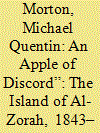

|
|
|
|
|
| Summary/Abstract |
Based on an extensive study of archival records, this article shows how a series of episodes in the history of the Trucial Coast — today’s United Arab Emirates (UAE) — helped to shape the direction of the area’s history. At face value, the island of al-Zorah appeared to have little to offer, but it nevertheless figured in the ambitions of the Wahhābīs, local rulers and the British, all of whom coveted it for one reason or another; the outcome of their struggles helped to set the seal on the future configuration of the UAE. While the article provides a valuable insight into Great Britain’s role in the area, it also reveals regional rivalries and inter-tribal tensions that still exist in the region today. However, the coming together of the UAE and Saudi Arabia, and their need to show solidarity in the face of current challenges, have obscured the historical differences that the story of al-Zorah represents.
|
|
|
|
|
|
|
|
|
|
|
|
|
|
|
|
| 17 |
ID:
126827
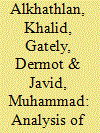

|
|
|
|
|
| Publication |
2014.
|
| Summary/Abstract |
We analyze oil export behavior by Saudi Arabia and the Rest of OPEC since 1973. In the literature there has been a wide range of estimates of their correlation: from positive, to zero, to negative. We find that the correlation has varied over time, from moderately high (0.7) in normal periods, to negative during each of five interruptions; the average correlation has been 0.19. Saudi Arabia's oil market behavior depends upon circumstances, but its primary goal is the stability of OPEC and the world oil market. It will coordinate export reductions with the Rest of OPEC when faced with declining demand, but it will increase exports when faced with interruptions elsewhere in OPEC. Allowing for such differences provides evidence of intelligent, context-dependent consistency. But ignoring context - by wrongly assuming the same Saudi response in Normal periods and Interruptions - can lead to a conclusion of Saudi "inconsistency" because the difference in the responses has been obscured.
|
|
|
|
|
|
|
|
|
|
|
|
|
|
|
|
| 18 |
ID:
086333
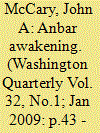

|
|
|
|
|
| Publication |
2009.
|
| Summary/Abstract |
The now-deceased leader of the Anbar Awakening, Sheikh Abd al Sittar Abu Reesha, once said, "Our American friends had not understood us when they came. They were proud, stubborn people and so were we. They worked with the opportunists, now they have turned to the tribes, and this is as it should be."1
Until 2007, the most violent region of insurgent attacks against U.S. forces in Iraq had been al Anbar, the largely rural, expansive western province stretching from the outskirts of Baghdad to Iraq's lengthy, mostly unsecured desert borders with Sunni-dominated Jordan, Saudi Arabia, and Syria.2 In what is most easily described as a marriage of convenience, Sunni insurgents and foreign Sunni al Qaeda fighters in al Anbar had formed a strategic and tactical alliance against what was perceived as an occupation by the United States or, more pointedly, against the occupation of a Muslim land by a largely Christian force, a deep affront to traditional Muslim values harkening back to the Crusades of the Middle Ages.3 Iraqis in al Anbar provided local knowledge, logistics, and up to 95 percent of the personnel, while experienced foreign al Qaeda fighters provided training, expertise, and financing. The pitch was simple: "We are Sunni. You are Sunni. The Americans and Iranians are helping the Shi'a - let's fight them together."
|
|
|
|
|
|
|
|
|
|
|
|
|
|
|
|
| 19 |
ID:
105665
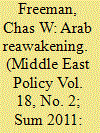

|
|
|
| 20 |
ID:
110161
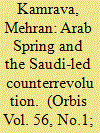

|
|
|
|
|
| Publication |
2012.
|
| Summary/Abstract |
The author contends that the Arab Spring has provided an opening for the Gulf Cooperation Council as a group and for Saudi Arabia as a long-time aspiring leader of the Arab world to try to expand their regional influence and global profile. An already weakened Arab state system, he argues, has been once again weakened by the sweeping wave of rebellion.
With its final chapter yet to be written, the Arab Spring of 2011 is likely to go down in history as a season of profound political changes that swept across the domestic politics of the Arab world. Even at this preliminary stage, that much is clear. What remains unclear, however, is how political change sweeping across the Middle East and North Africa is likely to alter the international relations of the Arab world in general and, in particular, the larger regional position and specific policy preferences of the Gulf Cooperation Council (GCC). Important considerations include the GCC's posture and profile vis-à-vis the Arab Spring, its collective reaction to the region-wide movements for political change, and its delicate relationship with its two troubled neighbors to the north, namely Iran and Iraq.
While the Arab Spring is unlikely to result in meaningful changes in Iran and Iraq's relationships with the GCC, it has fostered two discernible trends in the larger Arab world. First, Saudi Arabia has sought to reassert its position of prominence and leadership within the GCC. In fact, the kingdom has positioned itself as the chief architect of a counterrevolution to contain, and perhaps to even reverse, the Arab Spring as much as possible. Second, and an outgrowth of the first development, is the GCC's attempt to solidify its identity and mandate through the inclusion of additional Sunni monarchies-Morocco and Jordan-as a counterbalance, if not a substitute, to the Arab League.
|
|
|
|
|
|
|
|
|
|
|
|
|
|
|
|
|
|
|
|
|